James Scott Bell
@jamesscottbell
On a cool April night in 1950, a young actor got the chance to do a scene in the Actors Studio, in front of the legendary Lee Strasberg. This was the Valhalla of all up-and-coming actors in New York. It wasn’t easy to get a scene here, let alone be invited to join.
The scene called for this young actor to portray a soldier dying of gangrene. When the actor finished, Strasberg told him he had not sufficiently portrayed the pain of someone dying of this condition.
The actor interrupted him. He said that he, Strasberg, was the one who was misinformed. You see, this actor had been a Marine in combat during World War II, and had seen soldiers dying of gangrene. He knew that in the final stages they felt no pain at all.
Furious at being contradicted in front of the class, Strasberg told the actor to leave and never return. The actor responded with a two-word exit line before storming off.
The young actor’s name was Lee Marvin.
Marvin would ever after infuse his acting jobs with whatever truth was inside him. And what was inside him was a volcano.
Growing up, Marvin had ADD and dyslexia in a time when no one really knew how to deal with them. More discipline was the only prescription. No wonder Marvin hated school and was constantly in trouble. He was always fighting. Once, as a teenager in a boarding school his parents desperately tried, his roommate threw some trash out the window. Marvin told him that was a stupid thing to do. The roommate called him a son of a bitch. Marvin later recalled, “I said, ‘Call me that again and I’ll throw you out the window.’ He called me it again and I threw him out the window. So, they kicked me out of school.”
With fighting such a constant in his life, it was no surprise when, at age seventeen, just after the attack on Pearl Harbor, Lee Marvin joined the Marines.
After Boot Camp and training, he shipped out for action in the South Pacific. What he saw there was not the glory often depicted in the movies. He saw life-altering horror. He was a sniper with many kills. He also saw hand-to-hand combat, wiped out machine gun nests, and was almost killed on several occasions. Once, a Japanese soldier came at his face with a bayonet. Marvin took it away and bayoneted the soldier “all the way to the gun barrel . . .”
A climactic battle in Saipan resulted in 80% casualties in Marvin’s unit. Marvin was wounded and ended up in a hospital. He was 21 years old.
And from then on dealt with PTSD, alcoholism, and a four-pack-a-day cigarette habit.
But American men of that era were expected to “soldier on” in life, and that’s what Marvin did. Like so many returning vets he had a hard go finding what work to do. He spent time digging ditches and hand-threading pipes. And drinking.
Then one morning in 1946, Marvin was sleeping off a drunk in a public park in Woodstock, NY. A Red Cross nurse woke him up and started talking about community service. Next thing he knew he was involved in a local Red Cross benefit at the town hall, a production entitled (appropriately) “Ten Nights in a Barroom.”
He got the acting bug. He did what most actors did in those days, pounded the pavement in New York. He got some work, told Lee Strasberg off, and later headed to Hollywood where he heard there was money. He started landing small roles, and turned up on an early Dragnet episode. Jack Webb, star and producer of the cop show, was so impressed with Marvin’s performance that he made sure influential people around town saw it.
Marvin’s breakout role was Vince Stone, a mob strong arm in Fritz Lang’s The Big Heat (1953). In a chilling moment that made movie history, Vince gets mad at his girlfriend, played by Gloria Grahame. She’s been yapping to a cop. He throws a pot of scalding coffee in her face, scarring her. No wonder Marvin became a steady movie heavy after that.
To expand his image, Marvin starred in a late 50s TV cop series, M Squad. The money was good but he never took to the small box. Later he said, “Creatively, an actor is limited in TV. The medium is great for pushing goods. Sell the product, that’s the goal. . . But, I’m not interested in pushing the products; I’m interested in Lee Marvin, and where he’s going as an actor.”
We writers need to ask ourselves the same thing. Are we just trying to push a product, or do we have somewhere we want to go as a writer? Are we playing it safe? Or is there a truth we have that is burning to get out?
When Marvin was cast as the drunken gunfighter in Cat Ballou (1965), no one thought the movie or the role would do that much. But it became a surprise hit, and Marvin’s hilarious performance (given reality by his own struggle with the bottle) ended up winning him an Academy Award for Best Actor of the Year.
And that, in turn, rocketed Marvin into a star status he never gave up. Next came some iconic roles, including the tough major in The Dirty Dozen, and the remorseless thief bent on revenge in Point Blank.
But I think my favorite Marvin performance is in the under appreciated Western, Monte Walsh (1970). It’s an elegiac tribute to a cowboy in the fading West who refuses to give in. In a way, it sums up what the actor was all about. There’s a point in the film when Walsh is offered a part in a Wild West show, but he’d have to dress up in gaudy duds and put on a false front. Despite the money, despite the comfort, despite the security this would offer him, he refuses, saying, “I ain’t spittin’ on my whole life.”
Which assumes you have a life to be spat upon. A life lived with purpose and a truth you will stand up for.
When you can get that into your art—acting, fiction, painting, song, dance—you are leaving behind something more than product-pushing. You have a chance to carve out a unique and, perhaps, unforgettable place in your chosen field. Like Lee Marvin.
So what about you? Do you want to dress up in gaudy duds? Or do you want to be an artist with something to say?
***
Details in this article based in large part on the new Marvin biography by Dwayne Epstein, Lee Marvin: Point Blank (2013, Schaffner Press)

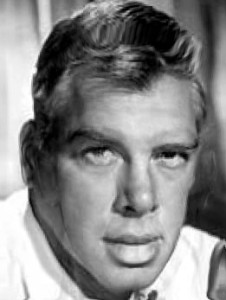
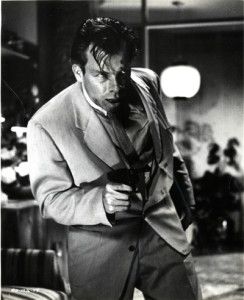
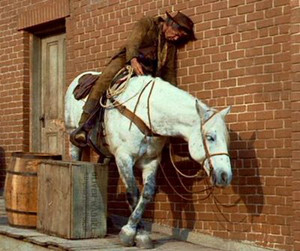
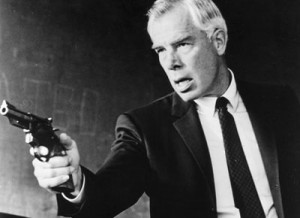
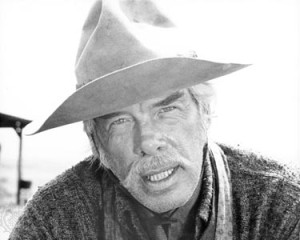
Oh! Thanks for the heads up on the biography. I need to get that. I didn’t follow Marvin’s career per se, but the absolute best episode of the TV show Bonanza featured my favorite actor, Pernell Roberts, and Lee Marvin as the warped bad guy in an episode called “The Crucible”. Fantastic episode and one I’ll never forget.
I definitely have something I want to say and sometimes it takes years for me to figure out what it IS I want to say. That’s why I have to follow my own path on my writing, not try to do it someone else’s way, even though I’m listening careful to the many pearls of wisdom shared by other writers who know the ropes.
Lee Marvin’s a favorite, and I just saw “Monte Walsh” on TCM last week, but never knew about his military service or his choices in his career. Now there’s that much more to admire.
It’s funny how you know these guys and never give a moment’s thought to their real lives. I love that Marvin turned down television so that he could be true to his acting. Good advice. When we chase the money, we lose the artist. I’ve found that to be true in my engineering career as well. Whenever I’ve followed the trend and gone after a paycheck, I’ve been miserable. Great post.
Great bio. Thanks for the thought provoking post, Jim. I definitely struggle with who I am as a writer. I stay true to my story & believe in my voice, but I’m constantly pushing my comfort zone to learn who I am as a writer & a person, because I think the journey has been the same for me. There are parallels in your work that mirror your life, whether you go gaudy duds or not.
You know, Jordan, maybe there are artists who were born for gaudy duds, and can wear them with unique style. Maybe the key is simply to make the clothes your own, and be true to the ones you wear.
Nice. Some people just want to entertain & strive for their own excellence. The process sustains them & fulfills them in a way that only they know. I could live with that, but there is something roiling around in me that needs to still come out. Your post is timely, as usual. Thank you.
One of Marvin’s most memorable roles for me was in Paint Your Wagon. Hearing him, um, sing “I Was Born Under a Wanderin’ Star” was a hoot. Like you said, though, he made that song his own, in his own way.
Next time we’re together, John, I want to hear you sing it.
I want it all. I want it all and I want it now.
But, first, I will settle for just getting my name out there, and if I have to wear a gaudy outfit or two, so be it. The risk is the pigeon-holing. Hopefully I will improve with each book until the gaudiness is no longer necessary. Such is the dream.
Does this mean I should lose the hat?
I loved the “out the window” bit. Sometimes in life it does come to that. And then . . . oh, boy.
Point Blank is on my list. Lee is what you would call, a piece of work and a stand-up guy.
Lee Marvin was one of my favorites, and usually it was for those roles he played as a drunk (don’t know why, since I’m not a fan of drunks, but if they’re funny, what’s the harm?)
I have always strove to write what I feel in my gut. Probably why no one ever picked me up (agent). I gotta live my truth, whatever I do.
Honest art (whatever form) is lasting art. The splash may cause a sensation, but fades so quickly. I will most likely remember your honest, heart-wrung words (written and spoken) long after the Zombie fiction has faded away. You are the best.
This harkens to a discussion I often have: what constitutes success? To some, it’s a best-seller. Tom others, it’s steady publication. To still others, it may be writing the books they want to write, and the other things are gravy. All are right. It depends on the individual making the decision, who is always the person in the mirror.
Well said, Dana.
Ah, 1965, Cat Ballou and the Beatles. I was in love with Michael Callan and Paul McCartney at the tender age of 10. I clearly remember Kid Shelleen (Lee Marvin) singing, Happy Birthday dear Frankie, as Cat’ father lay in a casket with lighted candles all around. He was never one of my favorites at that time, I was too young to appreciate his ability. Or maybe not, because he made me laugh and he made me nervous as the guy who had his nose bitten off and was after Cat. He was a gutsy actor. Write your truth. Great post, Jim.
Jim, As you often do, you’ve taken something from a movie (in this case, a great actor) and given us a lesson we can apply to our writing life. I wish I could have been a fly on the wall when Marvin told Stringberg “so long” (those HAVE to be the two words, right?)
There are times when I long to say, “I know about this stuff, you don’t” to those who criticize my medical scenes when I’ve been there and they haven’t. The next time that comes up, I’ll think about Lee Marvin.
Yes, thinking more on this, here’s Marvin doing light comedy, drama, thriller, even *gasp* musical, and giving all them his particular stamp. No matter what we choose to write, find your stamp!
Jim, best post yet! Had to read twice to enjoy again. Always loved Lee Marvin and now having a snapshot of his background – even more so. Even though “it’s all been done before” in stories and we may be taking someone else’s duds and making our own – it’s still our tale to tell. If we believe in our story – so will others. So we should aim to write the story we MUST tell, not THINK you should tell.
Thanks for the kind words, Donna. “It’s still our tale to tell.” Perfectly expressed.
To answer your question, Jim, I want both!
Thanks so much for your tribute to Lee Marvin. I watched M SQUAD as a wee lad…if you look up “hard-boiled” in the dictionary you’d find Lee Marvin’s picture there. The little television screens of the 1950s could barely contain him. That show — and the revolving wire paperback rack — shaped and informed my taste in genre fiction for decades to come. Once again, you’ve given us another keeper.
I dunno. There’s art for art’s sake–an advanced for of navel-gazing–and then there’s art for commerce. I do not believe that one is more noble than the other. In fact, I have more respect for the paperback writer who churns out four books a year to send his kids to college than I have for the university-fed auteur whose often incomprehensible words earn him a spot at society soirees.
From where I sit, as a writer of commercial fiction, this business is not about me or what I want. It’s about the readers and what they want. I happen to be at a happy place where my readers want what I enjoy giving them, but if I had to write porn to make ends meet, then I would proudly write porn. And it would be damned good porn, with a huge battle at the end.
John Gilstrap
http://www.johngilstrap.com
I fell in love with Lee Marvin as a young girl watching Cat Ballou. He was brilliant as Kid Shellene. I just saw it the other day and still had a great laugh.